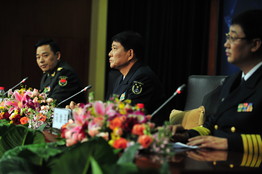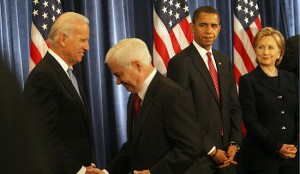Concerning U.S. Defense Cuts
BY Herschel SmithFollowing are some related but disaggregated thoughts on the upcoming U.S. Department of Defense budgetary cuts, along with some very good required reading on this subject.
Gates Readies Big Cuts in Weapons
As the Bush administration was drawing to a close, Robert M. Gates, whose two years as defense secretary had been devoted to wars in Iraq and Afghanistan, felt compelled to warn his successor of a crisis closer to home.
The United States “cannot expect to eliminate national security risks through higher defense budgets, to do everything and buy everything,” Gates said. The next defense secretary, he warned, would have to eliminate some costly hardware and invest in new tools for fighting insurgents.
What Gates didn’t know was that he would be that successor.
Now, as the only Bush Cabinet member to remain under President Obama, Gates is preparing the most far-reaching changes in the Pentagon’s weapons portfolio since the end of the Cold War, according to aides.
Two defense officials who were not authorized to speak publicly said Gates will announce up to a half-dozen major weapons cancellations later this month. Candidates include a new Navy destroyer, the Air Force’s F-22 fighter jet, and Army ground-combat vehicles, the offi cials said.
More cuts are planned for later this year after a review that could lead to reductions in programs such as aircraft carriers and nuclear arms, the officials said …
Gates is not the first secretary to try to change military priorities. His predecessor, Donald H. Rumsfeld, sought to retool the military but succeeded in cancelling only one major project, an Army artillery system.
Former vice president Dick Cheney’s efforts as defense chief under the first President Bush, meanwhile, are cited as a case study in the resistance of the military, defense industry, and Capitol Hill. Cheney canceled the Marine Corps’ troubled V-22 Osprey aircraft not once, but four times, only to see Congress reverse the decision.
And we’re glad that the V-22 Osprey program was completed. It is already making an impact in the Marine Corps expeditionary concept. The Captain’s Journal is still a supporter of Secretary Gates, but these defense cuts are both unnecessary and ill-advised (although not of Gates’ choosing in a perfect world). Beginning in 2011, Russian armed forces will undergo a comprehensive rearmament to refurbish and replaces weapons systems. While the U.S. is disarming, one of the only two near peers in the world is increasing and rearming its military. No, wait. Make that both near peer states.
Beijing Considers Upgrades to Navy
China’s top military spokesman said it is seriously considering adding a first aircraft carrier to its navy fleet, a fresh indication of the country’s growing military profile as it prepares for its first major naval deployment abroad.
At a rare news conference Tuesday, Chinese defense-ministry officials played down the importance of Beijing’s decision to send warships to the Gulf of Aden to curb piracy — China’s first such deployment in modern history — saying it doesn’t represent a shift in defense policy. The two destroyers and supply ship are to depart Friday for the Middle East.
But officials also made clear that China’s navy, which has been investing heavily in ships and aircraft, now has the capability to conduct complex operations far from its coastal waters — and that Beijing is continuing to expand its reach and capability, perhaps with a carrier.
It’s unclear what parts of an aircraft carrier China would build itself and what parts it might need to acquire from abroad. China has bought carriers before, but none ended up in the country’s fleet.
In some of the most direct public statements on current thinking behind Beijing’s naval policy, defense military spokesman Col. Huang Xueping said Tuesday that “China has vast oceans and it is the sovereign responsibility of China’s armed forces to ensure the country’s maritime security and uphold the sovereignty of its costal waters as well as its maritime rights and interests.”
At Information Dissemination, Galrahn makes a good observation on the importance of the expeditionary concept.
As we have noted many times on the blog, the amphibious ship is the hardest working type of ship in the US Navy in the 21st century. The data says all that needs to be said regarding the requirement.
They are flexible platforms that bring together a wide variety of capabilities that can effectively perform the range of mission profiles from soft power to forward afloat staging bases to even assault roles when necessary. They are the rapid responders when crisis breaks out on land, and best fit the most often called upon requirements of the US Navy when problems occur, whether it is Hezbollah/Israel or a natural disaster, the amphibious ship, not the aircraft carrier, is the type of platform sent into to help out people … The biggest problem with the sea basing concept isn’t the idea regarding how to get troops to land, but how to sustain troops from sea once we get them on land. The single largest factor that limits support is fuel.
The Captain’s Journal agrees with Galrahn and the importance of force projection – whether hard or soft power – with the Marines Expeditionary Units (including the “combined arms” concept of multiple naval vessels with various defensive and offensive capabilities. But with us it isn’t a matter of either-or. It’s both-and. We need both the carrier battle groups and the MEUs.
We will learn the lesson, again, the easy way or the hard way. But we must be prepared to fight both near peers and counterinsurgency campaigns. As for China, when they want to expand their global influence, the first big ship they go after is the carrier. Concerning Galrahn’s warning on the need for fuel, this highlights all the more the need for ports and air superiority for refueling tankers. Concerning overall air superiority, if the sole focus of our national defense dollars is in counterinsurgency, littoral combat and small wars, the MEUs will be left to the slaughter once the ordnance begins raining down from the sky.
Concerning this issue of being able to fight two wars at one time, the current administration is toying with this age-old doctrine.
The protracted wars in Iraq and Afghanistan are forcing the Obama administration to rethink what for more than two decades has been a central premise of American strategy: that the nation need only prepare to fight two major wars at a time.
For more than six years now, the United States has in fact been fighting two wars, with more than 170,000 troops now deployed in Iraq and Afghanistan combined. The military has openly acknowledged that the wars have left troops and equipment severely strained, and has said that it would be difficult to carry out any kind of significant operation elsewhere.
To some extent, fears have faded that the United States may actually have to fight, say, Russia and North Korea, or China and Iran, at the same time. But if Iraq and Afghanistan were never formidable foes in conventional terms, they have already tied up the American military for a period longer than World War II.
A senior Defense Department official involved in a strategy review now under way said the Pentagon was absorbing the lesson that the kinds of counterinsurgency campaigns likely to be part of some future wars would require more staying power than in past conflicts, like the first Iraq war in 1991 or the invasions of Grenada and Panama.
In an interview with National Public Radio last week, Defense Secretary Robert M. Gates made it clear that the Pentagon was beginning to reconsider whether the old two-wars assumption “makes any sense in the 21st century” as a guide to planning, budgeting and weapons-buying.
Be careful here. This seems like a prelude to deep cuts in the men and materiel necessary for air superiority, Naval superiority and force projection. Wait, we’ve already discussed this above, and it looks like that’s exactly what’s going to happen.
Finally, you will note that the cuts also target both nuclear refurbishment and development and the F-22 program. The Captain’s Journal has already weighed in on these issues.
An Aging Nuclear Weapons Stockpile
The three links above are required reading, as are the two links below (for those readers who aren’t convinced of the need to refurbish our existing nuclear weapons stockpile or continue further development).
Report of the Secretary of Defense Task Force on DoD Nuclear Weapons Management
National Security and Nuclear Weapons in the 21st Century
Finally, read this:






